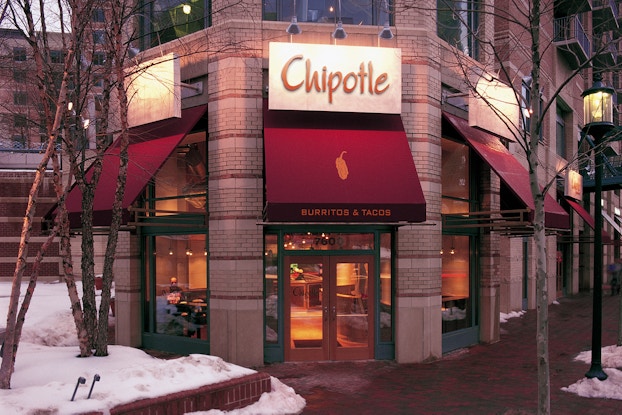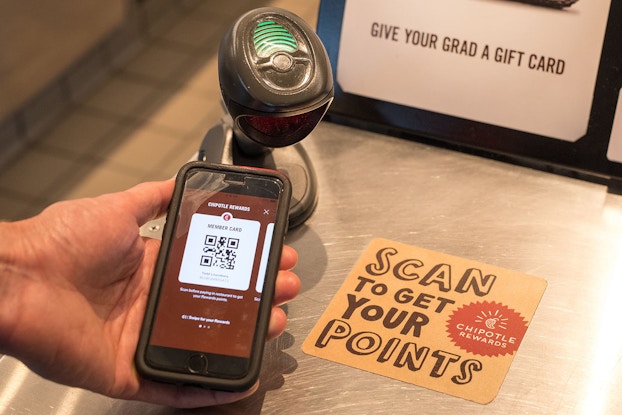
Key takeaways:
- CRM allows Chipotle to personalize messages to 17 million Chipotle Rewards members.
- Personalization represents a huge opportunity to restaurants, particularly amid increased adoption of digital ordering technologies.
- Incorporating messages that reflect the brand’s sustainable mission have 12% to 15% higher engagement rates.
Chipotle Mexican Grill has ramped up a massive customer relationship management (CRM) program over the last few years that is enabling it to distribute targeted and personalized messages to diners while remaining on-brand, the company said in a recent online presentation attended by CO—.
Speaking at the Retail Innovation Week conference, Jason Scoggins, director of loyalty and CRM at Chipotle, said the restaurant chain has been upgrading its technology infrastructure so that customer data obtained through its loyalty program pushes messages to consumers based on purchase histories and triggered by their activities and the restaurant’s own branding goals.

Interested in a small business membership?
Find out how the U.S. Chamber of Commerce can help your company grow and thrive in today's rapidly-evolving business environment. Connect with our team to learn how a small business membership can benefit your bottom line and help you achieve your goals.
Chipotle, based in Newport Beach, California, operates more than 2,600 restaurants and competes in the fast-casual segment of the restaurant industry, where service tends to be almost as fast as the quick-service, or fast-food, segment, but with higher quality, and often higher price points. Competitors in the segment include QDOBA Mexican Grill, Newk’s Eatery, Baja Fresh, Shake Shack and others.
Chipotle, known for its highly customizable burritos and bowls, began testing some loyalty programs on a small scale in 2015, but it wasn’t until early 2019 when it launched Chipotle Rewards nationally that the company began to see its possibilities for building closer customer relationships.
“Within the first week, we had over a million members in the program,” Scoggins explained. “So, it became really apparent, really fast, that we needed a full-blown CRM system so that we could take advantage of not just all the data coming in, but of having that relationship with our customers.”

By the end of 2019, Chipotle Rewards had grown to include eight million members, and by the end of 2020, the loyalty program’s reach more than doubled to 17 million members.
“We used to always say that our CRM program had more reach than placing ads in Monday night football,” said Scoggins. “But now if you think about it, we've eclipsed that.”
Creating better eating experiences
Industry observers have cited personalization as a significant opportunity for restaurants to drive sales going forward, especially as more foodservice companies have adopted mobile and digital ordering technologies during the pandemic.
Chipotle is using messaging to improve the digital experience for its customers who order via the app, by encouraging the order-customization features that the brand is known for. It sends emails to customers occasionally reminding them that they can ask for “a little less rice,” or “a little more salsa,” for example, just like they might if they were ordering on-site, where the food is prepared directly in front of them.
We used to always say that our CRM program had more reach than placing ads in Monday night football. But now if you think about it, we've eclipsed that.
Jason Scoggins, director of loyalty and CRM, Chipotle
Email communications to customers are assembled using individual “modules” that occur along a decision tree-like path, where specific customer activities prompt targeted responses.
Each digital message can be populated with the content of specific modules along the customer buying journey, such as the latest promotional offer on a menu item, or a more targeted offer to entice a customer that has not visited a restaurant for a certain period of time.
“If you’re Alex, and we know that you are from New York and that you like guacamole, we have a specific offer to get you re-engaged,” said Jason McCann, executive creative director at GALE, a creative media consultancy that works with Chipotle. “We would go through the module set and pick the appropriate content just for you.”
These journeys can involve multiple messages sent out over time. Drawing from the 700-ish individual components along the decision tree in different combinations offers the possibility of thousands of different individualized messages, based on the type of journey that the customer is on. Currently about 45% of the chain’s loyalty members are enrolled on one of the journeys, whether it’s a “welcome” journey for new members, a “reactivate” journey, a “maintain” journey, or a journey specifically targeting those customers deemed to be at risk of defection from the brand.
A recent Deloitte survey revealed that restaurants have room to improve their personalization efforts. The survey found that only 37% of 2,000 restaurant customers surveyed said they were “very” or “extremely” satisfied that restaurants remember them personally.
“When a brand personalizes the guest experience based on an understanding of their trends and patterns, it allows for the beginning of a relationship,” Deloitte said in a recent reporton the state of the restaurant industry.
At Chipotle, Scoggins said the company focuses on keeping the needs of the customer at the center of its CRM efforts.
“You can have the best tech suite out there, but if you don't really focus on the customer, then you're not going to see the results that you want to see,” he said.

Boosting engagement with purpose-driven messaging
Chipotle is also leveraging the reach of its CRM platform to create and reinforce widespread awareness around its core mission, “cultivating a better world,” Scoggins said. The mission, which revolves around health and sustainability, is often included in the brand’s messaging in simple ways, such as by sharing data points that tout its positive environmental impact, for example.
The strategy is a sign of the times, as consumers are increasingly demanding that food companies practice better sustainability and environmental stewardship, voting with their dollars for brands that do.
“Obviously, we're going to send you messages with some of our latest promotions,” said Scoggins. “But ultimately … we really want to make sure that we are spreading our purpose, in each and every message, and we've seen it really pay off.”
He said Chipotle has seen 12% to 15% higher engagement from consumers on all of its purpose-driven messaging. While businesses might be tempted to fire off emails and texts to customers with the sole intention of driving sales, Scoggins said businesses really need to “take a step back” and consider core branding or mission-related messages as well.
“Our customers know this about Chipotle, and they want it,” said Scoggins.
CO— aims to bring you inspiration from leading respected experts. However, before making any business decision, you should consult a professional who can advise you based on your individual situation.
Follow us on Instagram for more expert tips & business owners stories.
CO—is committed to helping you start, run and grow your small business. Learn more about the benefits of small business membership in the U.S. Chamber of Commerce, here.







